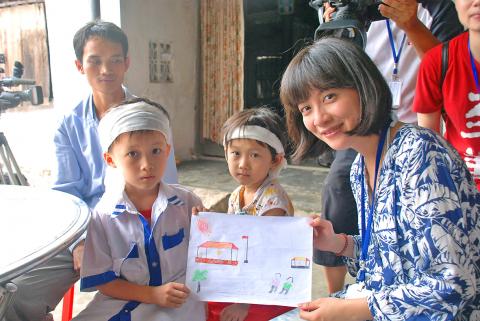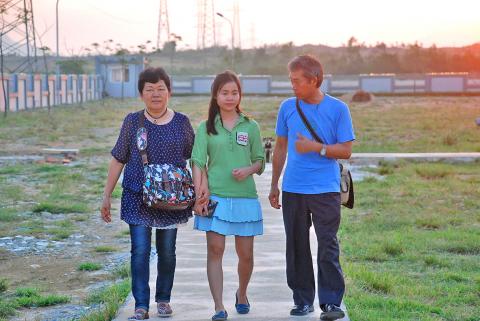Sponsoring a child from a developing nation might be common practice in Taiwan, but it is something else for sponsors and those they help to regard each other as family members and to learn each other’s languages.
Zhi Shan Foundation Taiwan has been well-supported by the public over its 20 years of efforts to help poorer Vietnamese children, and has seen many underprivileged children complete their high-school and college educations.
One such example is a female named Le Thi Thu who was sponsored by Feng Yin-lung (馮印龍) and his wife.

Photo: CNA
During a visit from the Zhi Shan Foundation, Feng and his family produced many letters from Thu, which they said foundation staff had in the beginning helped them translate, but in the end they knew enough Vietnamese to read the letters themselves.
Feng said he first started sponsoring Le Thi Thu in 2004, when she was in her second year of junior high school and he first visited her in 2005.
Feng said he had bought a basic Vietnamese phrasebook in the hope of being able to have a basic conversation with Le Thi Thu, but found that the book was in a different dialect from that spoken in Hue.

Photo: CNA
Feng said he then began to learn the dialect spoken in central Vietnam.
After completing university in Vietnam, Le Thi Thu applied to come to Taiwan in 2011 to learn Mandarin and to study a for master’s degree at Ming Chuan University’s school of tourism, Feng said.
Feng said it was regrettable that Le Thi Thu eventually dropped out of the course because she found it difficult to use multiple languages — both Mandarin and English — and family members became ill in Vietnam. However, he said that during her stay she completed her Mandarin studies and became fluent in the language.
When she returned to Vietnam, her Mandarin ability helped her to find a job at Phu Vinh Investment Building Infrastructure Co, within a month of returning to Vietnam, Feng said, and her monthly salary — equivalent to NT$10,000 — is a good salary in Vietnam.
“We have always treated her as our own daughter, and we are glad that she is not only able to take care of her family, but is also talking of getting married,” Feng said.
Separately, Hsu Ching-min (許清閔) has also dedicated himself to helping disadvantaged Vietnamese.
On a visit to Vietnam with the foundation to see the children he had sponsored, he said he learned that rural areas in central Vietnam have a severe shortage of books and disabled children face difficulties when going to the bathroom at school.
There are a large number of children with birth defects in the area, thought to be a result of chemicals such as Agent Orange dropped by the US during the Vietnam War.
Financial issues in rural areas prohibit schools from building disabled-friendly restrooms, Hsu said, adding that his desire to help motivated him to make as much money as possible in his job playing the Huqin.
Hsu said that between performing on the streets during the weekend, playing at the highway rest stop in Hsinchu County’s Guansi Township (關西) during the week and occasionally accepting offers to play at other venues, he had saved up a considerable sum, which he donated to help buy reading materials and to build disabled-friendly restrooms in Hue.
The foundation had estimated the cost for building disabled-friendly restrooms for male and female children at a school in the area would cost US$25,000, Hsu said, adding that he donated US$15,000 and the local government met the rest of the expense.
“I hope that my donations help attract children who are disabled in central Vietnam to attend Pinglu Elementary School,” Hsu said. “My donations toward helping Vietnamese children will not stop, because for every child I help, it means one more family might be lifted from poverty.”
Hsu said his next plan is to start a school lunch program for Vietnamese children, which would cost about NT$200,000 per year for 100 children.
“If I take on more commercial performances, it is possible for me to come up with the sum,” Hsu said.
Hsu said he hoped more Taiwanese would donate resources so Vietnamese children can go to school and receive medical care, adding that such donations go a long way toward helping these children have a chance to start a new chapter in their lives.

An essay competition jointly organized by a local writing society and a publisher affiliated with the Chinese Communist Party (CCP) might have contravened the Act Governing Relations Between the People of the Taiwan Area and the Mainland Area (臺灣地區與大陸地區人民關係條例), the Mainland Affairs Council (MAC) said on Thursday. “In this case, the partner organization is clearly an agency under the CCP’s Fujian Provincial Committee,” MAC Deputy Minister and spokesperson Liang Wen-chieh (梁文傑) said at a news briefing in Taipei. “It also involves bringing Taiwanese students to China with all-expenses-paid arrangements to attend award ceremonies and camps,” Liang said. Those two “characteristics” are typically sufficient

A magnitude 5.9 earthquake that struck about 33km off the coast of Hualien City was the "main shock" in a series of quakes in the area, with aftershocks expected over the next three days, the Central Weather Administration (CWA) said yesterday. Prior to the magnitude 5.9 quake shaking most of Taiwan at 6:53pm yesterday, six other earthquakes stronger than a magnitude of 4, starting with a magnitude 5.5 quake at 6:09pm, occurred in the area. CWA Seismological Center Director Wu Chien-fu (吳健富) confirmed that the quakes were all part of the same series and that the magnitude 5.5 temblor was

The brilliant blue waters, thick foliage and bucolic atmosphere on this seemingly idyllic archipelago deep in the Pacific Ocean belie the key role it now plays in a titanic geopolitical struggle. Palau is again on the front line as China, and the US and its allies prepare their forces in an intensifying contest for control over the Asia-Pacific region. The democratic nation of just 17,000 people hosts US-controlled airstrips and soon-to-be-completed radar installations that the US military describes as “critical” to monitoring vast swathes of water and airspace. It is also a key piece of the second island chain, a string of

The Central Weather Administration has issued a heat alert for southeastern Taiwan, warning of temperatures as high as 36°C today, while alerting some coastal areas of strong winds later in the day. Kaohsiung’s Neimen District (內門) and Pingtung County’s Neipu Township (內埔) are under an orange heat alert, which warns of temperatures as high as 36°C for three consecutive days, the CWA said, citing southwest winds. The heat would also extend to Tainan’s Nansi (楠西) and Yujing (玉井) districts, as well as Pingtung’s Gaoshu (高樹), Yanpu (鹽埔) and Majia (瑪家) townships, it said, forecasting highs of up to 36°C in those areas